 |
|
People have different ideas of heaven, March 26, 2006
People have different ideas of heaven. This is ours! We left Kolkata and came to the monastery/school called Bodhisukha in Barasat, beyond the airport. As soon as we entered the gates, we felt we had arrived. We certainly were no longer in chaotic India. There was Burmese order and tidiness all around.
 |
|
To backtrack, going way back. In 1986, we talked with the rector of the Pariyatti Sasana University in Mandalay, then under construction, about leaving Japan to live at the university and to teach English as a Second Language to the monks.
In 1988, we were ready to make the move, and the university officials had even designated a staff house for us, which would soon be finished. We met one of the monks teaching English, toured the facilities, saw the library (above the sima), and discussed our plans.
In Mingun, we had already paid our respects to Tipitaka Sayadaw, the founder of the University, and told him of our intentions. Before we left Rangoon, we met with the Chief of the Department of Religious Affairs in the Ministry of the Interior to discuss a residence visa. He offered to serve as our official sponsor.
Then Burma revolted. The crushing of Burma's democracy summer was the end of many dreams, ours included. When we left Burma at the end of August, on a plane with staff and diplomats of many embassies, we couldn't know that we would never again return legally to the country.
In Bangkok, we immediately took the details of the Sagaing Massacre to the Bangkok Post. We talked with journalists about what we'd heard of the army's brutal suppression of the revolution. We learned about the students who had fled to the border, and with that we began Burmese Relief Center--Japan, which later branched off into Burmese Relief Center--USA.
Our concern with Burma was always primarily with the monks and the Buddhists suffering so terribly inside the country or displaced and struggling to survive on the borders. While we cooperated with all humanitarian efforts, we felt a special desire to support student ordinations, monks' organizations, and lay Buddhist organizations, which were often overlooked by other NGOs and even discriminated against by some ethnic groups. Our sympathies were very much with the Mon, who were mainly ignored by the large relief agencies, and the Pwo Karen, whose language and culture were not, until recently, recognized in KNU schools.
Now, here we are in Barasat, outside Kolkata. Our monk-students, from Burma, India, (Tripura and Maharashtra), and Bangladesh, are diligent, polite, motivated, multilingual, composed, proper, dignified, and, in short, a pleasure to teach! Making materials for this class is a marvelous chance to read, research, and reorganize material that is profound and important. Nothing frivolous whatsoever! Which is not to say that we don't have humor in the class.
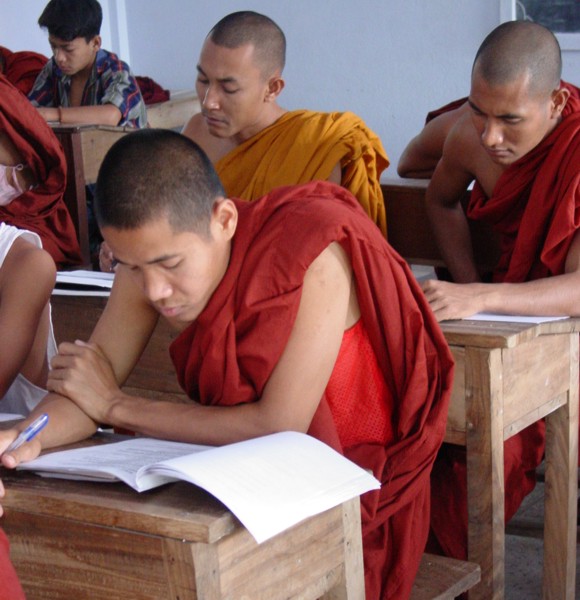 |
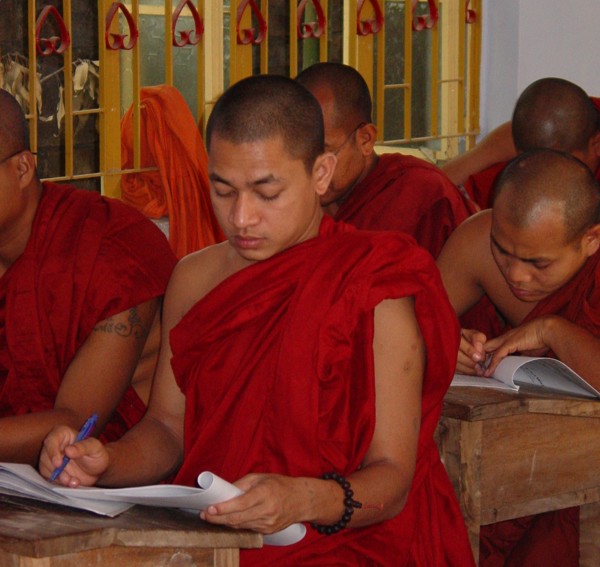 |
|||||
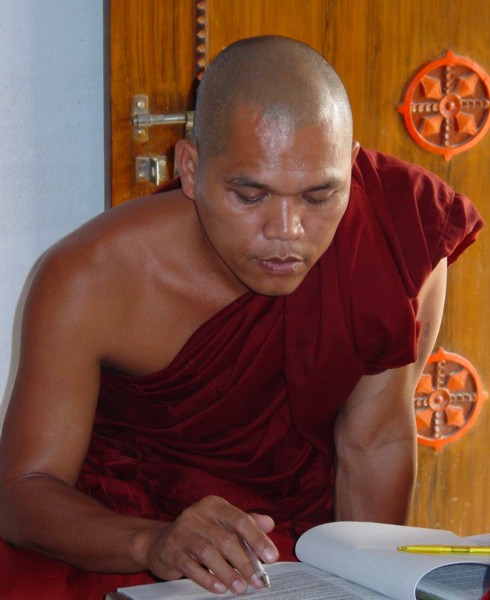 |
||||||
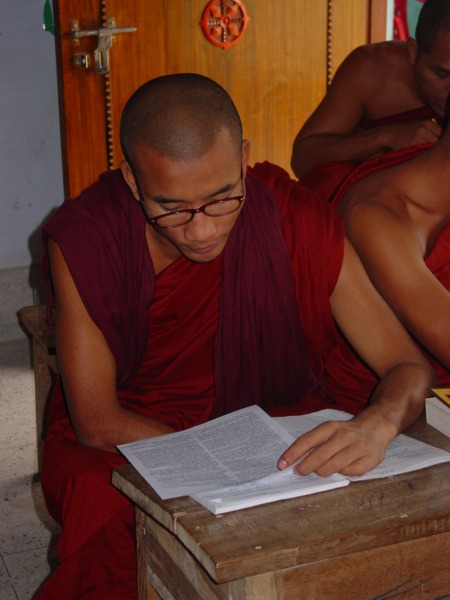 |
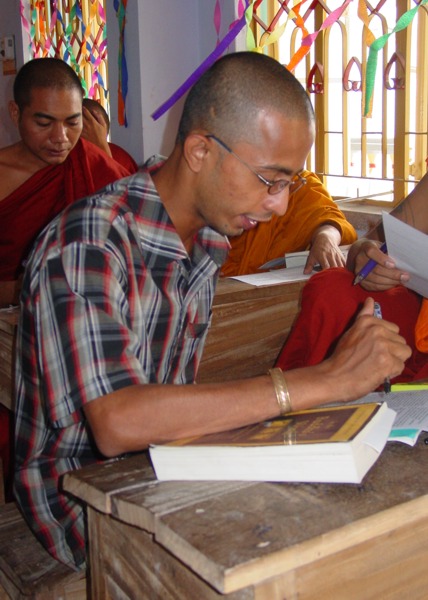 |
|||||
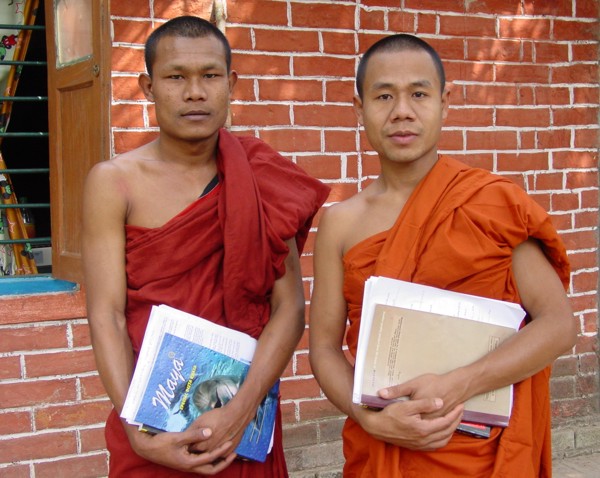 |
||||||
Our disclaimer (We have actually taught them the word!): we are English teachers, not Dhamma teachers. We are here to teach English through Buddhist materials, not the other way around. Certainly the monks are our teachers; a hundred times a day something comes up, and we learn something that we never knew before. It is exhilarating. When we can we use our extremely limited Pali (which they themselves are well educated in) but to get our meaning in English across, we can also clown, joke, dramatize, and act up.
What does reciprocate mean? Ken scratches Visakha's back (Ah-h-h-h!) and ... The students get it.
From a sutta we learn that obstinate and arrogant people are reborn in hell. If they achieve a human birth, they are born stupid. Knowing us, you can imagine how Ken played obstinate and arrogant! Great acting, and the students loved it. Bet they don't forget that in a hurry!
Fortunately, we have one young layman in the class. He was a monk for 15 days, the last day being our first day of class. Now he is the victim whenever it is necessary to explain words, such as "inflict," "hinder," and "accuse." Oh, the fetters and tribulations that poor young man must suffer under the insufferable wrath of a ham. All for a good cause, of course!
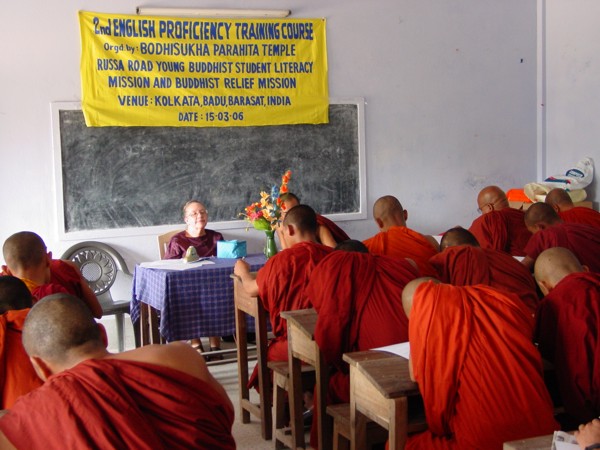 |
 |
|||
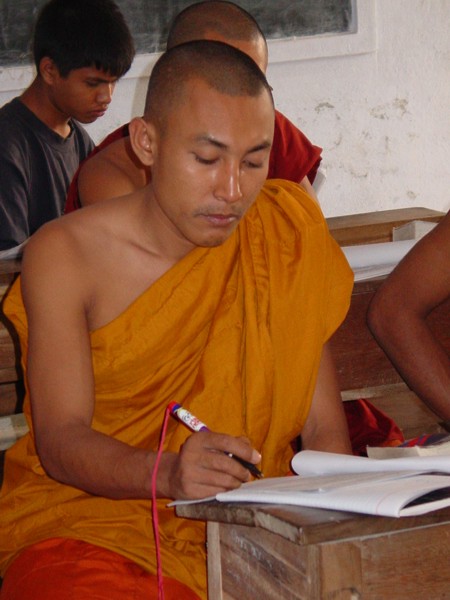 |
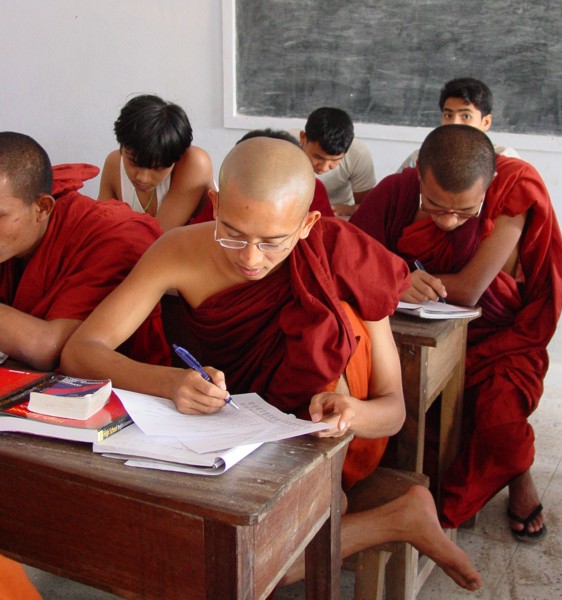 |
|||
When we cover big numbers, American style, we go up to decillion. It's very systematic, so easily mastered. It includes presenting the useful prefixes "bi-," "tri-" "quadri-," and up to "deci-." Here in India, we saw fit to compare this system with the traditional "lakh" (100,000) and "crore" (ten million), which are mentioned in Buddhist texts and still used today. One monk was able to expand this system, the first time we had ever heard it. One hundred lakhs make a crore. One hundred crores make an arab. We asked, "What do you have if you have 100 arabs?" Before the monk could reply, both of answered, "A mosque!" (Actually, the system continues: karab, badam, and shankh. {We also have a record of the Japanese system; man, oku, kyo,..., which a junior high student gave us fifteen years ago, but that slip of paper is in the infamous shipment!})
A word about our deluxe accommodations. We are in a lovely one-story house, where we occupy the room that was used by the Sayadaw (senior monk) from Burma, who led the meditation that preceded our classes. Our room has a ceiling fan, a bed with a wooden mosquito net frame (over which we have hung our super-size cotton mosquito net from Thailand). The bed is high enough for our suitcases to fit underneath so we look pretty neat. There is also a coffee table with two comfortable chairs where we compute, a desk and two wooden chairs in the corner, where we print our handouts and exercises, and an air conditioner! The lap of luxury! The young monk who looks after our well being installed a telephone wire so that we have an internet connection with dial-up. We are so comfortable, and so exhilarated by it all, that we do not complain that we are spending eighteen hours a day in our cell. They let us out for class; the toilet is just outside the door; delicious meals are brought promptly twice a day, and tea every afternoon. We have our computers, and the days are very productive. Our only regret is that the course will last only one month.
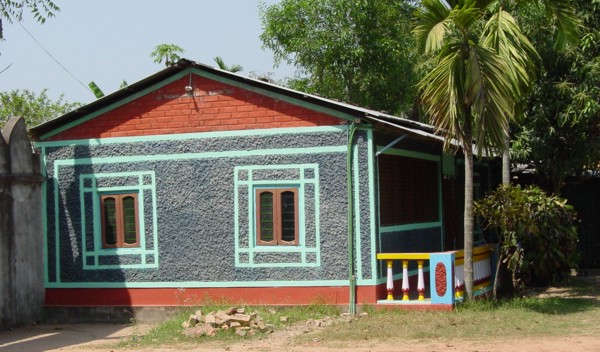 |
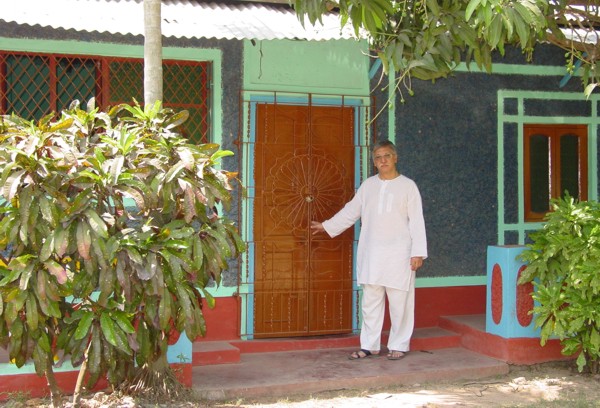 |
|||
 |
Our lodge
The front door A student from Arunachal Pradesh, whom we are supporting, came to visit us. |
|||
Each day we worship in the morning cool at the golden pagoda, which was built in 1999 and stands near our door. Then we have a simple breakfast, delivered to our room by some of the young boarding students from Tripura.
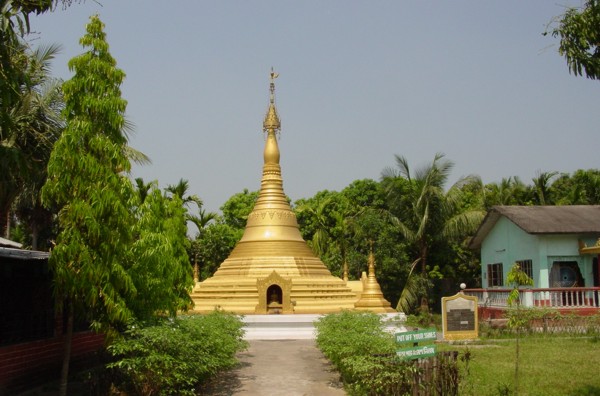 |
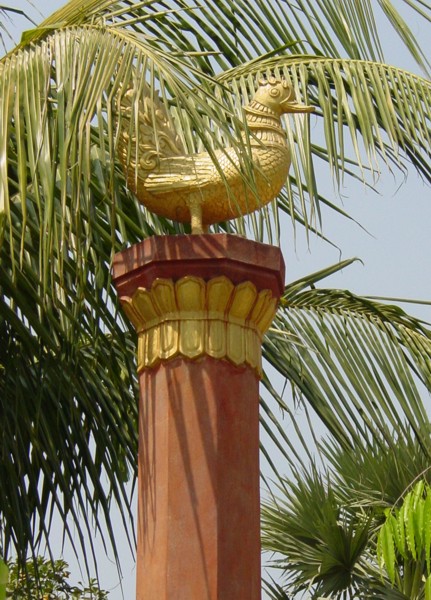 |
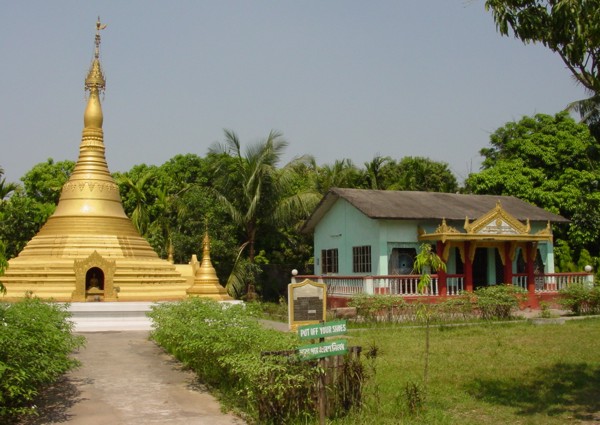 |
||||||||
|
The pagoda
|
The Hamsa
|
The pagoda and the ordination hall
|
||||||||
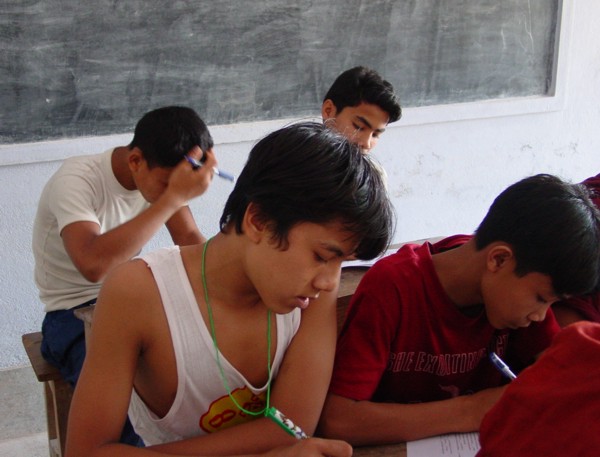 |
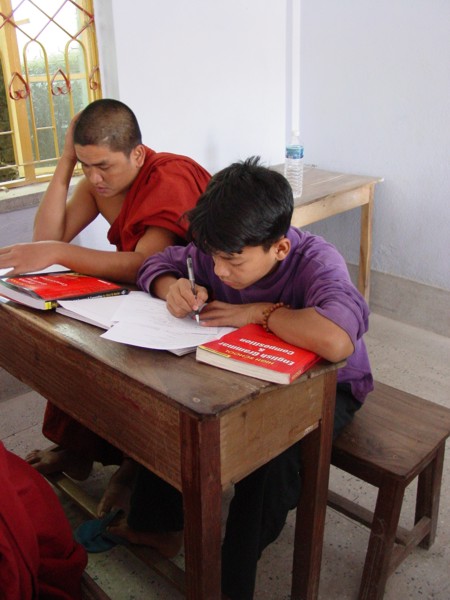 |
|||||||||
| Bodhisukha boarding students | ||||||||||
The walk to the school begins shortly before 8. We are saluted by the safety guard in his uniform as he opens the gate, painted in bold letters on one side: "Seek Permission to Enter," and on the other: "Keep Silent; Please" and below that "No Smoking." We walk past dormitories, the dining hall with kitchen behind, the office, and the teachers' quarters. Beside the path there is a tank surrounded by a sturdy bamboo fence. Ven. Nandobatha intends to fill it in to expand the school grounds. He is concerned for the students safety with the pond there, but, in the coming years, he plans to build a proper swimming pool. Public schools have such facilities, so this growing private school needs to follow suit.
 |
 |
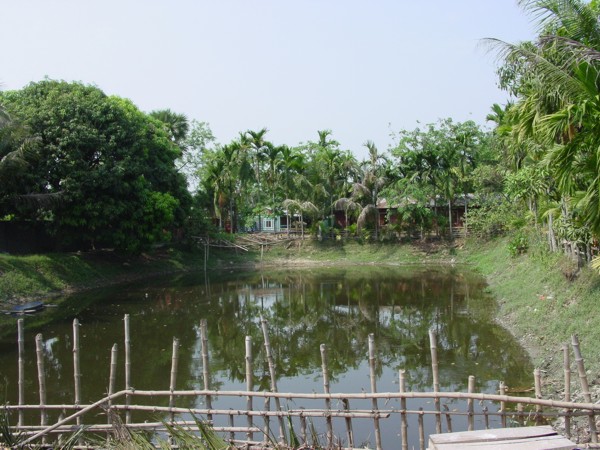 |
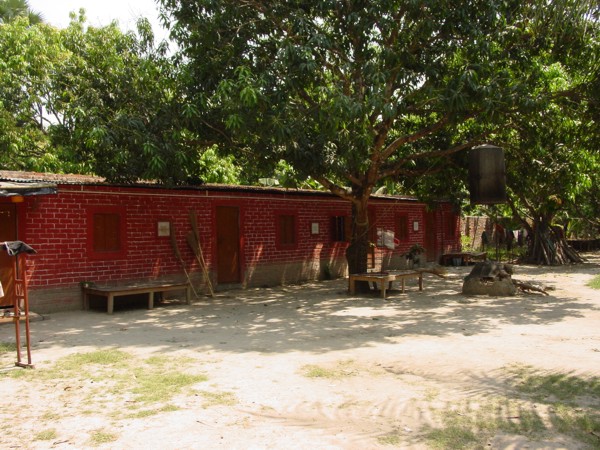 |
||
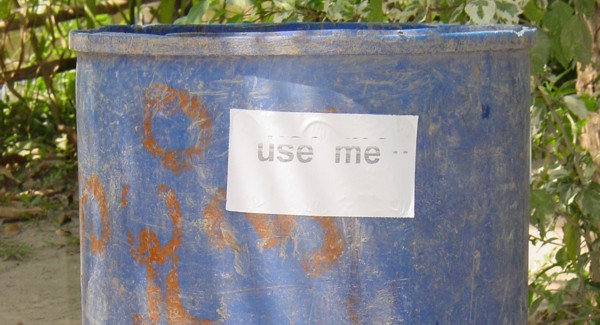 |
|||||
|
Dormitory for the boarding students
|
|||||
Morning classes are centered around suttas from Bhikkhu Bodhi's new compilation, "In the Buddha's Words." The monks are already thoroughly familiar with the readings in Pali and Burmese/Hindi/Bengali, so it is really only the English that is new. We always read aloud first so the class can have a clear model, then we go over vocabulary and interesting grammar points. Some of them are a little shy in speaking up individually, but they have no hesitation in repeating and choral reading, what with their tradition of recitation, and their booming voices are a match for Ken's.
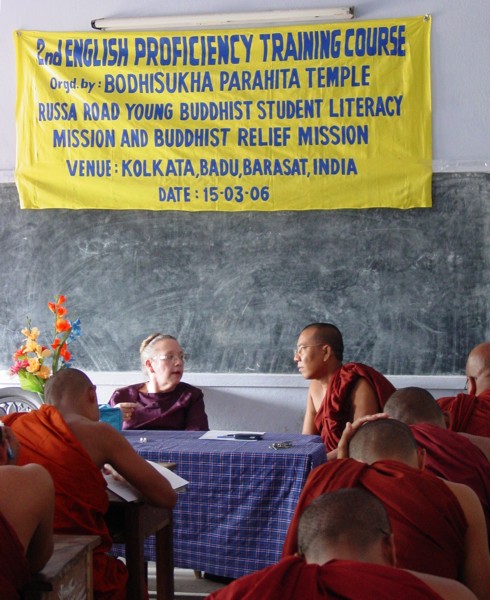 |
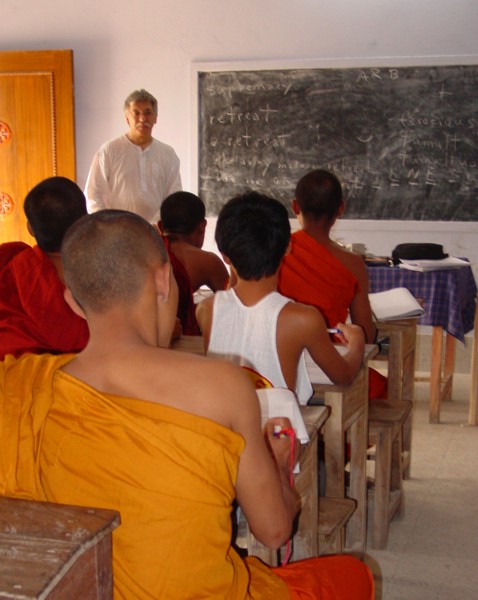 |
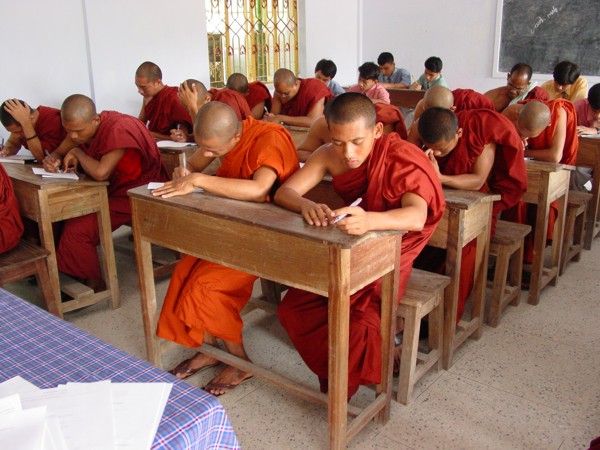 |
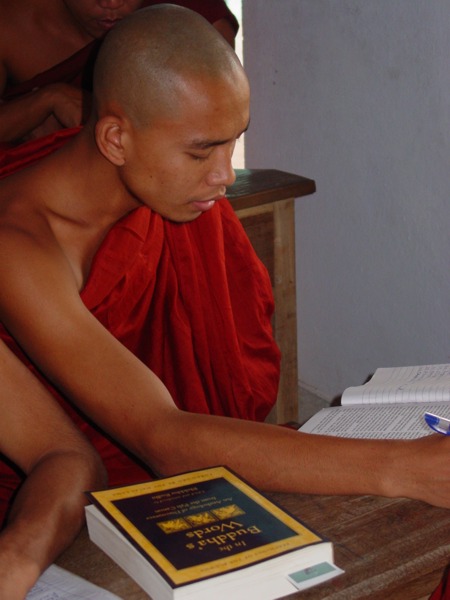 |
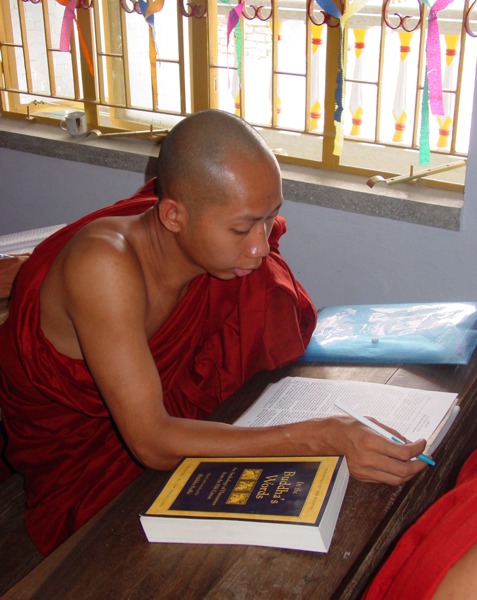 |
|
We are also doing selected meditations compiled from previous Students of the Lotus sessions. These fit nicely into the sutta materials.
 |
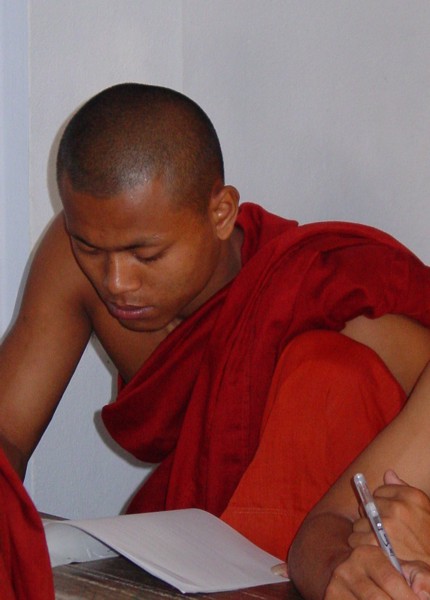 |
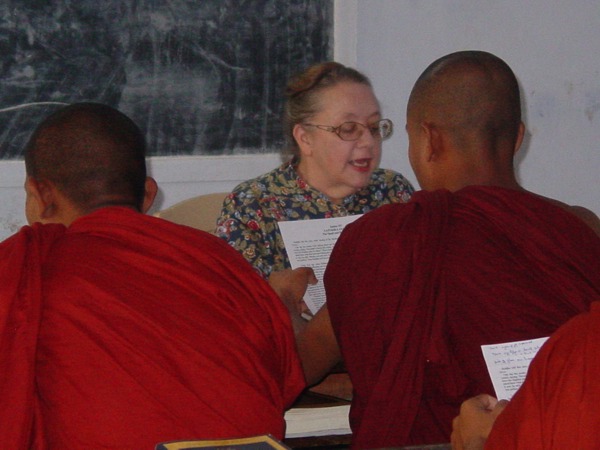 |
||
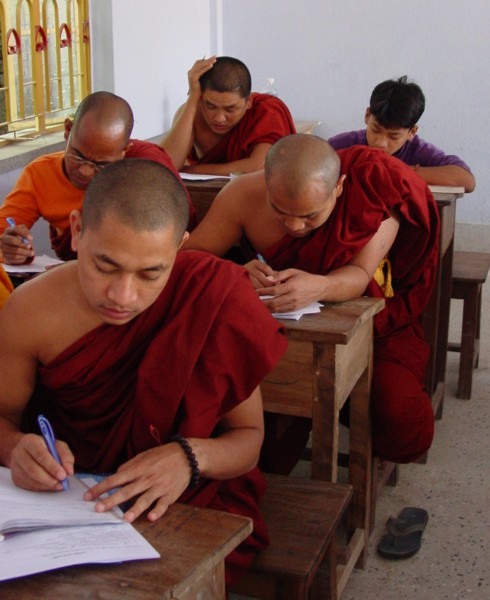 |
||||
In the afternoon, we truly appreciate the shady trees lining the walk. It's getting hotter by the day here, but luckily we will miss the worst of summer. June in Kolkata is pretty hard to bear, we've been told. For afternoon classes, we usually stick to grammar, sometimes using our own materials, other times falling back on a highschool grammar book used here in India (with lots and lots of amazing examples and exercises, but NO mistakes!) The explanations about grammar rules are, of course, incomprehensible and rife with exceptions, but the variety of subjects included in this book are well worth the price of admission. For example: The cricket influence is obvious in: "The captain praised Balu. Balu"s bowling was very good." Then there is this classical sentence for transformation: "He is buried near Rome, and the myrtles grow round his grave. -- He is buried near Rome in a place where myrtles grow." To demonstrate the use of bring: "He brought forth (adduced) several cogent arguments in support of the scheme." And to teach the meaning of Irony: "No doubt but ye are the people, and wisdom shall die with you." If that isn't sufficient, then this: "The atrocious crime of being a young man, which the honourable gentleman has, with such spirit and decency, charged upon me, I shall neither attempt to palliate nor deny." Nor should you!
 |
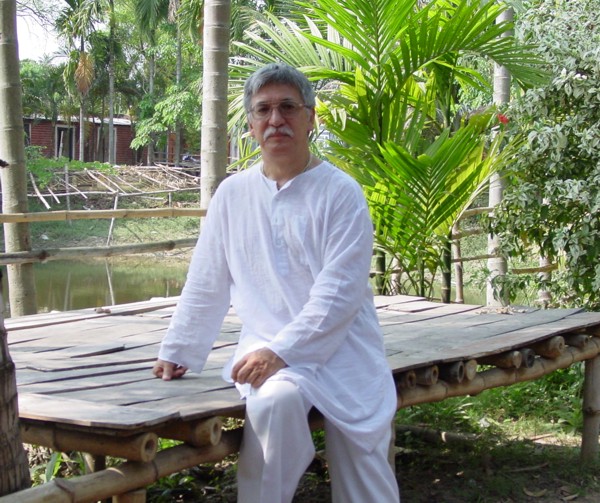 |
|
While we might poke a little fun at the grammar book, we must admit we haven't yet found any errors in it. Certainly if the level of language in the exercises is any indication, we need wonder no longer why so many jobs involving our mother tongue are being outsourced here to India!
In the evenings, we all gather in the dining room to read a topical article on a subject for discussion. The monks suggested various subjects they found of interest, including Bhikkhuni ordination, untouchability, the so-called restoration of pagodas in Pagan and in Arakan being carried out by the junta, globalization and the right to water, child abuse, Buddhism in Bangladeshi, the history of Tripura, Angulimala, the prison Buddhist chaplaincy program in UK, and monks working to prevent the spread of HIV/AIDS in Cambodia.
The discussions are getting freer as the monks get used to our English and gain confidence. As one said, "We are not allowed to study English in Burma. If we hadn't come to India, we'd never have a chance to learn like this, ever."
We're teaching six and a half days a week. We would have been happy to make it seven, but the students wanted a partial holiday on Sunday to catch up on their work and have a little rest. Some, like Ven. Pannaasila, needed time to go to Kolkata for meetings. He is very involved in a number of campaigns and for the preparations for conversions in October which will coincide with the 50th anniversary of Dr. Ambedkar's embracing of Buddhism with half a million Dalit followers. There will be ceremonies in Nagpur and Bombay with again half a million conversions. We have promised to be here (there), and will be tapping Northwest for the ticket.
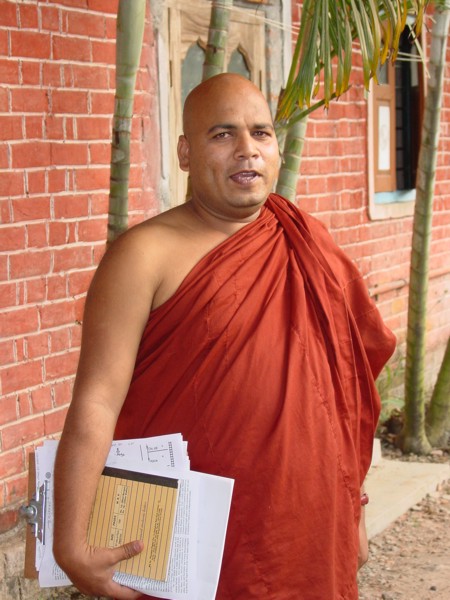 |
|
We probably need to explain something about the history of Bodhisuka school, which we've been involved in from its beginnings. The school is the result of a great dream of some monks from Arakan.
 |
||
| The old school bus, which has been replaced. | ||
We first communicated with Ven. Nandobatha in 1994 when he was a graduate student in Nalanda, working on his PhD. Together with a group of monk friends from Arakan, he contacted us and invited us to assist a free clinic being set up near Nalanda to help the impoverished local people. Of course, we were interested. When he wrote with the request for help for the poor foreign monks studying in India, we thought that was a very good idea too. The group registered officially with the Indian government in 1995. When Visakha's brother died suddenly, the idea of a scholarship for monks in his name seemed a fitting memorial. When the group wrote us about their dream to buy land and establish a school for poor boys from Tripura and Aranchal Pradesh, we were again impressed and enthusiastic. The Bodhisukha school seemed to be a perfect way to use Visakha's mother's last donation to Buddhist Relief Mission. She had taken great interest in the scsolarship program in her son's memory; she had relished Ven. Nandobatha's letters about the need for the school and the red tape he and his friends had overcome to realize it. We had always shared the photos and news from Calcutta with her, so in her name, we helped to build Bodhisukha.
The school is growing, one grade a year. Physically, it is going up, too, as the brand new classroom building adds another floor. Eventually, it will be a splendid four-story building. Ven. Nandobatha has already arranged to buy, making a preliminary down payment, the field right outside the monastery wall, which will be used for athletics and play. Even now, the students have a heavenly amount of space, compared to most facilities in crowded Japan!
 |
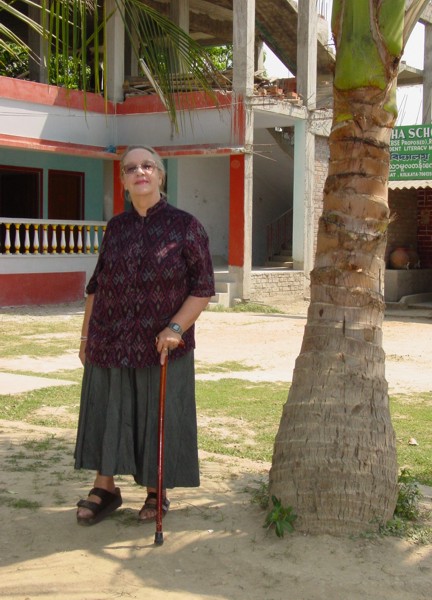 |
 |
|
There are already quite a few little scholars from the local community, and the school's reputation is growing nicely. The students we care about the most, however, are the boys who have come all the way from Tripura. They are from minority Buddhist communities, and many are orphans who would have had absolutely no chance for education if they hadn't been brought to Calcutta. Here, far from home, they live, work, study, and grow. They are serious, responsible, poised, and mature beyond their years.